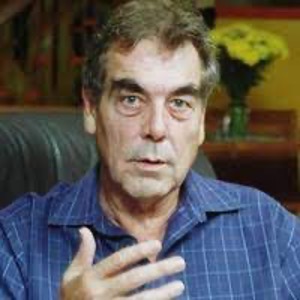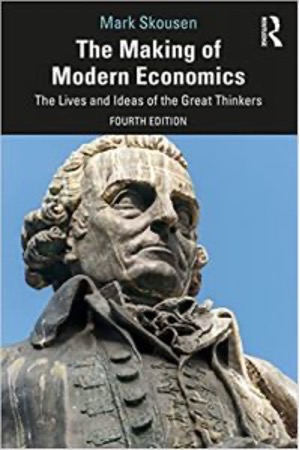How My Book Converted Marxists — And Was Banned on Campus
“How many a man has dated a new era in his life from the reading of a book.” — Henry David Thoreau, “Walden”
I’m sure many of you received a book or two for Christmas. Maybe some of you gave away a copy of one of my books.
I’m most proud of “The Making of Modern Economics,” which has gone through four editions since 2001. The original publisher, Mike Sharpe, told me that he thinks it’s a well-deserved sequel and replacement for Robert Heilbroner’s famous “The Worldly Philosophers.” He predicted it would go through numerous editions and be translated into many foreign languages.
Since the first edition was published on March 9, 2001 (amazingly, the anniversary of the exact same “pub date” as the Wealth of Nations, on March 9, 1776!) I’ve received a number of letters and reviews saying that my chapters on Karl Marx and John Maynard Keynes — the two most famous critics of Adam Smith and his invisible hand doctrine — offer the best critique they have read.
Chapter six, “Marx Madness Plunges Economics into a New Dark Age,” offers a point-by-point refutation of Karl Marx’s theories of capitalism, labor, imperialism and exploitation, to the point that it has converted many Marxists into free-market advocates.
A Surprise Letter from the Philippines
After the first edition came out, I received a surprising letter from a friend, Mark Tier, who lived for many years in the Philippines. He told me the following story of what happened when students started reading my book at the University of the Philippines, a hotbed of Marxism:

Mark Tier.
Dear Mark,
A 17-year-old student at the University of the Philippines had been swayed by the emotional appeal of a meeting on the plight of the poor and joined the League of Filipino Students. This is a student activist movement that ‘fights for the poor.’ In fact, it was a front organization for the recruitment of the Communist Party of the Philippines, the New Peoples’ Army and the National Democratic Front, a guerilla outfit in the hills.
Afterward, he signed up for what’s called ‘mass integration’ over the semester break, two weeks living in the mountains with the NPA, getting immersed in their ‘poor, noble’ way of life and being bombarded with propaganda.
The class in question was sociology, the professor being an out-and-out Marxist. In fact, the University of the Philippines, the country’s top-rated university, was a hotbed of Marxists. Everything was related, one way or another, back to Marx.
I’d just gotten your new book, The Making of Modern Economics, and my girlfriend showed your chapter on Marx to this student and invited him to read it. Which he did.
Well… it really had an impact. He photocopied the chapter and took it away to read it again. The next day he pulled out of the ‘mass integration,’ and quit the League of Filipino Students.
That’s not the end of the story. He typed your entire chapter into an email that he sent to his teacher. He hadn’t been talking to other students, and gave them copies of your chapter to read. To date, three more who were going on the two-week ‘mass integration’ had pulled out.
Best, Mark (Tier)
In a later email, Mark Tier told me that the teacher himself abandoned Marxism and became a supporter of free-market capitalism, but the leaders of the Communist Party and the National Democratic Front were so incensed by the influence of my book that they had it removed from the library at the University of the Philippines. My book had been banned!
Since then, “The Making of Modern Economics” has gone through three revised editions and is now published by Routledge, the top British publisher.
‘The Single Best Book Ever Written in Economics’
Want to read the thrilling episodes of the great economic thinkers and how they changed the world? Get a copy of my book, “The Making of Modern Economics.” It also makes a great gift to students in college (even high school).

Click here for a complete run-down of the book, chapter by chapter.
Richard Rahn states in the Washington Times, “Mark Skousen has produced the single best book on virtually all of those who have had a significant impact in economics — good or bad — regardless of their political leanings. It’s a delight to read cover-to-cover.”
John Mackey, CEO of Whole Foods Market, says, “Mark’s book is fun to read on every page. I’ve read it three times, and recommend it to all my friends.”
But the book is controversial too and has been attacked by Marxists, Keynesians and even Austrians (despite having three chapters on the Austrian school).
Foreign Affairs magazine said the book is “fascinating and infuriating, but engaging, readable and colorful.”
Milton Friedman said it best: “All histories of economics are BS — Before Skousen!”
It’s now available in hardback, paperback, ebook and audiobook (beautifully narrated by Robertson Dean) on Amazon.
The retail price of the paperback is $49, but you pay only $35 postpaid if you order directly from me at www.skousenbooks.com. I autograph all copies and mail them at no extra charge to the addresses of buyers in the United States.
Greg Feirman, manager of Top Gun Financial writes: “Skousen is a brilliant and prolific economist as well as writer of a popular financial newsletter, Forecasts & Strategies, for decades now. Because of his interest in financial markets, Skousen is an economist obsessed with the real-world applicability of his economic ideas. He has written over 20 books, including ‘Economic Logic’, his brilliant introductory textbook to economics, and ‘The Making of Modern Economics’, the best history of modern economics around.”
And the late great William F. Buckley, Jr., wrote, “I champion Skousen’s book to everyone. I keep it by my bedside and refer to it often. An absolutely ideal gift for college students.”
May you all have a happy and prosperous New Year. If you have a chance, make plans to attend next year’s FreedomFest, July 12-15, 2023, in Memphis. We will be celebrating Adam Smith’s birth 300 years ago. And much more! Use the $50 discount code EAGLE50 to sign up at www.freedomfest.com.
Good investing, AEIOU,
![]()
Mark Skousen
You Blew It!
Electric Vehicles (EVs): The Thrill of Victory and the Agony of Defeat
The truth is finally coming out about electric vehicles (EVs), the darling of the environmentalists who consider them the wave of the future.
Now, the reality is setting in, especially with regard to Tesla. The stock is now down 70% this year.
From a practical viewpoint, the biggest fear is the running of electric power and being stuck in the middle of nowhere. It’s called “range anxiety,” and it’s especially a problem in freezing weather. EVs can incur up to 35% range loss during freezing temperatures, as EV owners have recently discovered during the holiday travel season.
Then, there’s the worry of finding charging stations, charging times, limited driving range, replacing battery packs (expensive) and even potential fires.
EV owners have experienced chronic problems with the display screens, exterior door lights, failing temperature sensors, mismatched paint and seals and weatherstripping. According to the latest Consumer Reports, EVs are less reliable than gas-fueled automobiles and hybrids.
Hybrids are a much better choice. They are the best of both worlds because you don’t have to plug in these vehicles to get electric power, they get better gas mileage and they are more reliable. What’s not to like?
EVs are in fact too costly for most car buyers, even with the $7,500 tax credit. They are luxury automobiles. The Tesla is a rich man’s sports car.
Finally, there’s the issue of how environmentally clean are the EVs. The fact is that they actually are a bigger pollution problem than internal-combustion cars! As a recent Foundation for Economic Freedom (FEE) article stated: “According to the International Energy Agency (IEA), an electric vehicle requires six times the mineral inputs of a comparable internal combustion engine vehicle (ICE). EV batteries are very heavy and are made with some exotic, expensive, toxic and flammable materials.
“The primary metals in EV batteries include Nickel, Lithium, Cobalt, Copper and Rare Earth metals (Neodymium and Dysprosium). The mining of these materials, their use in manufacturing and their ultimate disposal all present significant environmental challenges. Ninety percent of the ICE lead-acid batteries are recycled while only five percent of the EV lithium-ion batteries are.
“Oil has been so demonized that we tend to overlook some of its positive traits as a power source relative to the battery power of EVs. The power for an internal combustion engine, oil, is a homogeneous commodity found abundantly around the world (especially in our own backyard). In 2019, the four top oil-producing nations were the United States, Russia, Saudi Arabia, and Canada. In contrast, the power of EVs is dependent on a mixture of diverse commodities from just a handful of third-world countries.
“In spite of the environmental hysteria about oil drilling, the surface area disturbed is relatively small since the oil is extracted from under the ground. In contrast, many of the materials prominent in the clean energy revolution are obtained through open-pit horizontal mining which is extremely damaging to wide areas of the environment.”
Click here to read the entire article.

